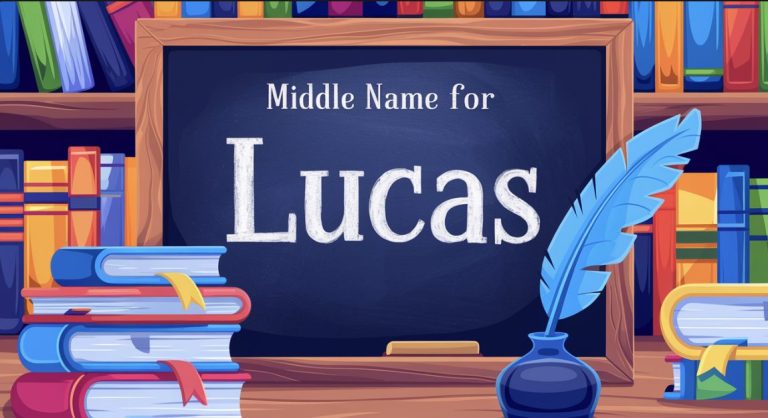Looking for a strong middle name for your little Roman? You’re not alone in this quest to find that perfect name that creates a meaningful full identity.
Middle names aren’t just fillers on official forms – they’re a chance to honor family, celebrate heritage, or connect to something special.
For many parents, this extra name becomes a way to pass down traditions or add a touch of uniqueness.
In this guide, we’ll walk through the best middle name options for Roman – from mythological choices that echo ancient stories, to nature-inspired picks that bring a touch of the outdoors.
We’ll cover classic standbys, modern trends, and even names inspired by literature and history. Let’s find that perfect middle piece that completes your child’s name story.
The Role of Middle Names in Personal Identity
Middle names play an important role in shaping personal identity. They often carry family history, traditions, or cultural significance.
For many people, middle names are a way to honor relatives, with parents choosing names passed down through generations.
These names can also represent values or beliefs, connecting individuals to their heritage or religious practices.
Additionally, middle names offer a sense of individuality. In some cases, a middle name may allow a person to stand out or express a unique connection to something special, such as nature or a favorite author.
For some, middle names can also provide flexibility. They can be used in different social or professional settings, offering another way to express oneself.
Overall, middle names are more than just an extra name; they hold meaning and significance in a person’s life.
Mythological Middle Names For Roman
1. Roman Apollo
-
Pronunciation: uh-PAH-loh
-
Origin: Greek
-
Meaning: Apollo is the Greek god of the sun, music, poetry, and healing.
2. Roman Zeus
-
Pronunciation: ZOOS
-
Origin: Greek
-
Meaning: Zeus is the king of the Greek gods, ruler of the sky, thunder, and justice.
3. Roman Orion
-
Pronunciation: oh-RYE-un
-
Origin: Greek
-
Meaning: Orion was a giant huntsman in Greek mythology who was placed among the stars as a constellation.
4. Roman Thor
-
Pronunciation: THOR
-
Origin: Norse
-
Meaning: Thor is the Norse god of thunder, lightning, storms, oak trees, and strength.
5. Roman Odin
-
Pronunciation: OH-din
-
Origin: Norse
-
Meaning: Odin is the chief of the Norse gods, associated with war, wisdom, poetry, and magic.
6. Roman Hercules
-
Pronunciation: HER-kyoo-leez
-
Origin: Greek
-
Meaning: Hercules is a hero in Greek mythology known for his strength and the twelve labors he performed.
7. Roman Atlas
-
Pronunciation: AT-lus
-
Origin: Greek
-
Meaning: Atlas was a Titan in Greek mythology who was condemned to hold up the sky.
8. Roman Achilles
-
Pronunciation: uh-KILL-eez
-
Origin: Greek
-
Meaning: Achilles was a Greek hero of the Trojan War, known for his near invincibility except for his heel.
9. Roman Ares
-
Pronunciation: AIR-eez
-
Origin: Greek
-
Meaning: Ares is the Greek god of war, representing the violent and chaotic aspects of battle.
10. Roman Phoenix
-
Pronunciation: FEE-nix
-
Origin: Greek
-
Meaning: The Phoenix is a mythical bird that is reborn from its ashes, symbolizing immortality and renewal.
11. Roman Perseus
-
Pronunciation: PUR-see-us
-
Origin: Greek
-
Meaning: Perseus was a Greek hero known for slaying the Gorgon Medusa and rescuing Andromeda.
12. Roman Hermes
-
Pronunciation: HER-meez
-
Origin: Greek
-
Meaning: Hermes is the Greek god of trade, travel, and communication, also known as the messenger of the gods.
13. Roman Hades
-
Pronunciation: HAY-deez
-
Origin: Greek
-
Meaning: Hades is the Greek god of the underworld, ruling over the realm of the dead.
14. Roman Loki
-
Pronunciation: LOH-kee
-
Origin: Norse
-
Meaning: Loki is a trickster god in Norse mythology, known for causing mischief and chaos.
15. Roman Poseidon
-
Pronunciation: poh-SYE-don
-
Origin: Greek
-
Meaning: Poseidon is the Greek god of the sea, earthquakes, and horses.
16. Roman Theseus
-
Pronunciation: THEE-see-us
-
Origin: Greek
-
Meaning: Theseus is a Greek hero known for slaying the Minotaur and uniting Athens.
17. Roman Dionysus
-
Pronunciation: dye-oh-NYE-sus
-
Origin: Greek
-
Meaning: Dionysus is the Greek god of wine, revelry, and fertility.
18. Roman Cerberus
-
Pronunciation: SUR-ber-us
-
Origin: Greek
-
Meaning: Cerberus is the three-headed dog guarding the gates of the underworld in Greek mythology.
19. Roman Minerva
-
Pronunciation: mi-NUR-vah
-
Origin: Roman
-
Meaning: Minerva is the Roman goddess of wisdom, arts, and war.
20. Roman Pandora
-
Pronunciation: pan-DOR-ah
-
Origin: Greek
-
Meaning: Pandora is a figure in Greek mythology, known for opening a box that released all the evils of the world.
21. Roman Juno
-
Pronunciation: JOO-noh
-
Origin: Roman
-
Meaning: Juno is the Roman goddess of marriage and the queen of the gods.
22. Roman Persephone
-
Pronunciation: per-SEF-oh-nee
-
Origin: Greek
-
Meaning: Persephone is the Greek goddess of the underworld, and the daughter of Demeter.
23. Roman Hera
-
Pronunciation: HEH-rah
-
Origin: Greek
-
Meaning: Hera is the Greek goddess of marriage and the wife of Zeus.
24. Roman Eros
-
Pronunciation: AIR-oss
-
Origin: Greek
-
Meaning: Eros is the Greek god of love and desire, often depicted as a winged youth.
25. Roman Artemis
-
Pronunciation: AR-teh-miss
-
Origin: Greek
-
Meaning: Artemis is the Greek goddess of the hunt, wilderness, and childbirth.
26. Roman Selene
-
Pronunciation: seh-LEE-nee
-
Origin: Greek
-
Meaning: Selene is the Greek goddess of the moon.
27. Roman Nyx
-
Pronunciation: NIKS
-
Origin: Greek
-
Meaning: Nyx is the Greek goddess of the night.
28. Roman Demeter
-
Pronunciation: dih-MEE-ter
-
Origin: Greek
-
Meaning: Demeter is the Greek goddess of the harvest and agriculture.
29. Roman Iris
-
Pronunciation: EYE-riss
-
Origin: Greek
-
Meaning: Iris is the Greek goddess of the rainbow and a messenger of the gods.
30. Roman Prometheus
-
Pronunciation: pro-MEE-thee-us
-
Origin: Greek
-
Meaning: Prometheus is the Greek Titan who gave fire to humanity and was punished by Zeus.
31. Roman Athena
-
Pronunciation: ah-THEE-nah
-
Origin: Greek
-
Meaning: Athena is the Greek goddess of wisdom, courage, and warfare.
32. Roman Circe
-
Pronunciation: SUR-see
-
Origin: Greek
-
Meaning: Circe is a sorceress in Greek mythology who turned Odysseus’s men into pigs.
33. Roman Mars
-
Pronunciation: MAHRS
-
Origin: Roman
-
Meaning: Mars is the Roman god of war and the father of Romulus and Remus.
34. Roman Hyperion
-
Pronunciation: high-PEER-ee-on
-
Origin: Greek
-
Meaning: Hyperion is a Titan in Greek mythology associated with the sun.
35. Roman Helios
-
Pronunciation: HEE-lee-os
-
Origin: Greek
-
Meaning: Helios is the Greek god of the sun, often depicted driving a chariot across the sky.
36. Roman Gaia
-
Pronunciation: GAY-ah
-
Origin: Greek
-
Meaning: Gaia is the Greek goddess of the Earth, often considered the mother of all life.
Nature-Inspired Middle Names For Roman
37. Roman River
-
Pronunciation: RIV-er
-
Origin: English
-
Meaning: River is a natural watercourse, often a symbol of life, journey, and movement.
38. Roman Forest
-
Pronunciation: FOR-est
-
Origin: English
-
Meaning: Forest refers to a large area of land covered with trees, symbolizing nature, life, and tranquility.
39. Roman Sky
-
Pronunciation: SKY
-
Origin: English
-
Meaning: Sky refers to the expanse above the Earth, representing freedom, vastness, and beauty.
40. Roman Ash
-
Pronunciation: ASH
-
Origin: English
-
Meaning: Ash is the name of a tree and also symbolizes strength and endurance, often linked to mythology.
41. Roman Stone
-
Pronunciation: STONE
-
Origin: English
-
Meaning: Stone symbolizes stability, strength, and endurance.
42. Roman Cedar
-
Pronunciation: SEE-dar
-
Origin: English
-
Meaning: Cedar is a type of tree known for its strength and durability, often symbolizing longevity and protection.
43. Roman Wolf
-
Pronunciation: WULF
-
Origin: English
-
Meaning: Wolf represents power, independence, and cunning in nature.
44. Roman Sage
-
Pronunciation: SAYJ
-
Origin: English
-
Meaning: Sage is a plant and also means a wise and thoughtful person.
45. Roman Oak
-
Pronunciation: OAK
-
Origin: English
-
Meaning: Oak is a strong and long-living tree, symbolizing strength, endurance, and resilience.
46. Roman Moss
-
Pronunciation: MAWSS
-
Origin: English
-
Meaning: Moss is a small, green plant that symbolizes persistence and adaptability.
47. Roman Willow
-
Pronunciation: WIL-oh
-
Origin: English
-
Meaning: Willow is a tree known for its flexibility and adaptability, often representing grace and resilience.
48. Roman Bear
-
Pronunciation: BEHR
-
Origin: English
-
Meaning: Bear represents strength, courage, and leadership in nature.
49. Roman Reed
-
Pronunciation: REED
-
Origin: English
-
Meaning: Reed refers to a slender plant and symbolizes flexibility and adaptability.
50. Roman Hunter
-
Pronunciation: HUN-ter
-
Origin: English
-
Meaning: Hunter refers to one who hunts and symbolizes pursuit, strength, and determination.
51. Roman Maple
-
Pronunciation: MAY-pul
-
Origin: English
-
Meaning: Maple is a tree known for its sweet sap, often symbolizing balance and strength.
52. Roman Cliff
-
Pronunciation: KLIFF
-
Origin: English
-
Meaning: Cliff refers to a steep face of rock and symbolizes solid, unmovable strength.
53. Roman Ocean
-
Pronunciation: OH-shun
-
Origin: English
-
Meaning: Ocean represents vastness, depth, and mystery.
54. Roman Blaze
-
Pronunciation: BLAYZ
-
Origin: English
-
Meaning: Blaze refers to a bright fire or intense light, symbolizing energy and passion.
55. Roman Dawn
-
Pronunciation: DAWN
-
Origin: English
-
Meaning: Dawn refers to the first light of day, symbolizing new beginnings and hope.
56. Roman Ridge
-
Pronunciation: RIDGE
-
Origin: English
-
Meaning: Ridge refers to a long, narrow hilltop or crest, symbolizing stability and elevation.
57. Roman Finch
-
Pronunciation: FINCH
-
Origin: English
-
Meaning: Finch is a small bird known for its agility and cheerfulness, symbolizing freedom.
58. Roman Storm
-
Pronunciation: STORM
-
Origin: English
-
Meaning: Storm symbolizes power, change, and intensity.
59. Roman Flint
-
Pronunciation: FLINT
-
Origin: English
-
Meaning: Flint refers to a type of stone used for starting fires, symbolizing energy and resilience.
60. Roman Snow
-
Pronunciation: SNOH
-
Origin: English
-
Meaning: Snow represents purity, clarity, and calmness.
61. Roman Hawk
-
Pronunciation: HAWK
-
Origin: English
-
Meaning: Hawk is a bird of prey, symbolizing vision, focus, and freedom.
62. Roman Fern
-
Pronunciation: FURN
-
Origin: English
-
Meaning: Fern is a plant known for thriving in shaded areas, symbolizing endurance and growth.
63. Roman Rain
-
Pronunciation: RAYN
-
Origin: English
-
Meaning: Rain symbolizes renewal, cleansing, and growth.
64. Roman Ember
-
Pronunciation: EM-bur
-
Origin: English
-
Meaning: Ember refers to a small, glowing piece of coal or wood, symbolizing warmth and passion.
65. Roman Birch
-
Pronunciation: BURCH
-
Origin: English
-
Meaning: Birch is a tree known for its smooth white bark, symbolizing renewal and purification.
66. Roman Prairie
-
Pronunciation: PRAYR-ee
-
Origin: English
-
Meaning: Prairie refers to a large area of grassland, symbolizing openness and peace.
67. Roman Mountain
-
Pronunciation: MOUN-tin
-
Origin: English
-
Meaning: Mountain symbolizes strength, stability, and grandeur.
68. Roman Grove
-
Pronunciation: GROHV
-
Origin: English
-
Meaning: Grove refers to a small wood or forest, symbolizing peace and natural beauty.
69. Roman Skyler
-
Pronunciation: SKY-ler
-
Origin: English
-
Meaning: Skyler is a variation of the name Skyler, meaning “sheltering in the sky” or “eternal life.”
70. Roman Leaf
-
Pronunciation: LEEF
-
Origin: English
-
Meaning: Leaf symbolizes life, growth, and renewal in nature.
71. Roman Canyon
-
Pronunciation: KAN-yun
-
Origin: English
-
Meaning: Canyon refers to a deep gorge, often carved by water, symbolizing depth and strength.
Classic Middle Names For Roman
72. Roman James
-
Pronunciation: JAYMZ
-
Origin: Hebrew
-
Meaning: James is derived from the Hebrew name Jacob, meaning “supplanter” or “one who follows.”
73. Roman Edward
-
Pronunciation: ED-ward
-
Origin: Old English
-
Meaning: Edward means “wealthy guardian,” often associated with leadership and nobility.
74. Roman William
-
Pronunciation: WIL-yum
-
Origin: Old German
-
Meaning: William means “resolute protector,” symbolizing strength and protection.
75. Roman Thomas
-
Pronunciation: TAH-muhs
-
Origin: Aramaic
-
Meaning: Thomas means “twin,” and is often associated with loyalty and doubt in the Christian tradition.
76. Roman Joseph
-
Pronunciation: JO-sef
-
Origin: Hebrew
-
Meaning: Joseph means “Jehovah increases,” symbolizing growth and divine blessing.
77. Roman Henry
-
Pronunciation: HEN-ree
-
Origin: German
-
Meaning: Henry means “ruler of the household,” symbolizing leadership and authority.
78. Roman George
-
Pronunciation: JORJ
-
Origin: Greek
-
Meaning: George means “farmer” or “earthworker,” symbolizing hard work and diligence.
79. Roman Charles
-
Pronunciation: CHARLZ
-
Origin: Germanic
-
Meaning: Charles means “free man” and is often associated with nobility and strength.
80. Roman Alexander
-
Pronunciation: al-ex-AN-der
-
Origin: Greek
-
Meaning: Alexander means “defender of the people,” symbolizing courage and leadership.
81. Roman Benjamin
-
Pronunciation: BEN-juh-min
-
Origin: Hebrew
-
Meaning: Benjamin means “son of the right hand,” symbolizing favor and strength.
82. Roman Samuel
-
Pronunciation: SAM-yoo-uhl
-
Origin: Hebrew
-
Meaning: Samuel means “God has heard,” symbolizing divine favor and prophecy.
83. Roman Daniel
-
Pronunciation: DAN-yuhl
-
Origin: Hebrew
-
Meaning: Daniel means “God is my judge,” symbolizing righteousness and divine justice.
84. Roman David
-
Pronunciation: DAY-vid
-
Origin: Hebrew
-
Meaning: David means “beloved,” symbolizing love, compassion, and strength.
85. Roman Michael
-
Pronunciation: MY-kul
-
Origin: Hebrew
-
Meaning: Michael means “who is like God?” symbolizing strength and protection.
86. Roman Matthew
-
Pronunciation: MATH-yoo
-
Origin: Hebrew
-
Meaning: Matthew means “gift of God,” symbolizing divine blessing and generosity.
87. Roman John
-
Pronunciation: JON
-
Origin: Hebrew
-
Meaning: John means “God is gracious,” symbolizing kindness and mercy.
88. Roman Peter
-
Pronunciation: PEE-ter
-
Origin: Greek
-
Meaning: Peter means “rock” or “stone,” symbolizing stability and faith.
89. Roman Richard
-
Pronunciation: RICH-erd
-
Origin: Old German
-
Meaning: Richard means “brave ruler,” symbolizing courage and leadership.
90. Roman Robert
-
Pronunciation: ROB-urt
-
Origin: Germanic
-
Meaning: Robert means “bright fame,” symbolizing honor and recognition.
91. Roman Albert
-
Pronunciation: AL-burt
-
Origin: Germanic
-
Meaning: Albert means “noble and bright,” symbolizing wisdom and nobility.
92. Roman Frank
-
Pronunciation: FRANGK
-
Origin: Germanic
-
Meaning: Frank means “free man” or “a member of the Germanic tribe,” symbolizing freedom and strength.
93. Roman Christopher
-
Pronunciation: KRIS-toh-fer
-
Origin: Greek
-
Meaning: Christopher means “Christ-bearer,” symbolizing faith and guidance.
94. Roman Jack
-
Pronunciation: JAK
-
Origin: English
-
Meaning: Jack is a diminutive of John, meaning “God is gracious,” symbolizing kindness and mercy.
95. Roman Andrew
-
Pronunciation: AN-droo
-
Origin: Greek
-
Meaning: Andrew means “manly” or “brave,” symbolizing strength and courage.
96. Roman Anthony
-
Pronunciation: AN-tho-nee
-
Origin: Latin
-
Meaning: Anthony means “priceless” or “of inestimable worth,” symbolizing value and significance.
97. Roman Victor
-
Pronunciation: VIK-tor
-
Origin: Latin
-
Meaning: Victor means “conqueror” or “winner,” symbolizing victory and achievement.
98. Roman Simon
-
Pronunciation: SY-muhn
-
Origin: Hebrew
-
Meaning: Simon means “he has heard,” symbolizing understanding and wisdom.
99. Roman Brian
-
Pronunciation: BRY-an
-
Origin: Irish
-
Meaning: Brian means “noble” or “strong,” symbolizing power and honor.
100. Roman Walter
-
Pronunciation: WAWL-ter
-
Origin: Germanic
-
Meaning: Walter means “ruler of the army,” symbolizing leadership and strength.
101. Roman Philip
-
Pronunciation: FIL-ip
-
Origin: Greek
-
Meaning: Philip means “lover of horses,” symbolizing strength and nobility.
102. Roman Arthur
-
Pronunciation: AR-thur
-
Origin: Celtic
-
Meaning: Arthur means “bear,” symbolizing courage, strength, and leadership.
103. Roman Maurice
-
Pronunciation: MAWR-iss
-
Origin: Latin
-
Meaning: Maurice means “dark-skinned” or “Moorish,” symbolizing mystery and depth.
104. Roman Leonard
-
Pronunciation: LEE-oh-nard
-
Origin: Germanic
-
Meaning: Leonard means “brave lion,” symbolizing courage and strength.
105. Roman Theodore
-
Pronunciation: THEE-uh-dohr
-
Origin: Greek
-
Meaning: Theodore means “gift of God,” symbolizing blessings and grace.
106. Roman Vincent
-
Pronunciation: VIN-sent
-
Origin: Latin
-
Meaning: Vincent means “conquering” or “prevailing,” symbolizing victory and triumph.
Modern Middle Names For Roman
107. Roman Ace
-
Pronunciation: AYS
-
Origin: Latin
-
Meaning: Ace means “one” or “best,” symbolizing excellence and victory.
108. Roman Jaxon
-
Pronunciation: JAK-son
-
Origin: Modern English
-
Meaning: Jaxon is a modern variation of the name Jackson, meaning “son of Jack.”
109. Roman Maverick
-
Pronunciation: MAV-er-ick
-
Origin: English
-
Meaning: Maverick means “independent” or “nonconformist,” symbolizing individuality and free spirit.
110. Roman Cruz
-
Pronunciation: KROOZ
-
Origin: Spanish
-
Meaning: Cruz means “cross,” symbolizing faith and strength.
111. Roman Zion
-
Pronunciation: ZYE-on
-
Origin: Hebrew
-
Meaning: Zion refers to a biblical place symbolizing a utopian society or heaven.
112. Roman Kingston
-
Pronunciation: KING-stun
-
Origin: English
-
Meaning: Kingston means “king’s town,” symbolizing royalty and leadership.
113. Roman Dash
-
Pronunciation: DÆSH
-
Origin: English
-
Meaning: Dash means “a small amount,” symbolizing energy and flair.
114. Roman Ryker
-
Pronunciation: RYE-ker
-
Origin: Dutch
-
Meaning: Ryker means “rich” or “powerful ruler,” symbolizing strength and authority.
115. Roman Finn
-
Pronunciation: FIN
-
Origin: Irish
-
Meaning: Finn means “fair” or “white,” symbolizing purity and strength.
116. Roman Oakley
-
Pronunciation: OAK-lee
-
Origin: Old English
-
Meaning: Oakley means “oak tree meadow,” symbolizing strength and nature.
117. Roman Jett
-
Pronunciation: JET
-
Origin: English
-
Meaning: Jett refers to a black gemstone, symbolizing energy and elegance.
118. Roman Luca
-
Pronunciation: LOO-kah
-
Origin: Latin
-
Meaning: Luca means “light,” symbolizing illumination and clarity.
119. Roman Kai
-
Pronunciation: KYE
-
Origin: Hawaiian
-
Meaning: Kai means “sea,” symbolizing calm and fluidity.
120. Roman Beckett
-
Pronunciation: BEK-it
-
Origin: Old English
-
Meaning: Beckett means “bee cottage” or “dweller by the stream,” symbolizing peace and nature.
121. Roman Levi
-
Pronunciation: LEE-vye
-
Origin: Hebrew
-
Meaning: Levi means “joined” or “attached,” symbolizing unity and loyalty.
122. Roman Crew
-
Pronunciation: KROO
-
Origin: English
-
Meaning: Crew refers to a group of people working together, symbolizing teamwork and unity.
123. Roman Easton
-
Pronunciation: EES-ton
-
Origin: Old English
-
Meaning: Easton means “east town,” symbolizing new beginnings and hope.
124. Roman Hayes
-
Pronunciation: HAYZ
-
Origin: Old English
-
Meaning: Hayes means “hedged area,” symbolizing protection and strength.
125. Roman Wilder
-
Pronunciation: WIL-der
-
Origin: Old English
-
Meaning: Wilder means “wild,” symbolizing freedom and adventure.
126. Roman Theo
-
Pronunciation: THEE-oh
-
Origin: Greek
-
Meaning: Theo means “God,” symbolizing divinity and spirituality.
127. Roman Roman
-
Pronunciation: ROH-man
-
Origin: Latin
-
Meaning: Roman refers to the people of Rome, symbolizing strength and legacy.
128. Roman Hendrix
-
Pronunciation: HEN-drix
-
Origin: English
-
Meaning: Hendrix means “son of Hendrick,” symbolizing power and music.
129. Roman Bodhi
-
Pronunciation: BOH-dee
-
Origin: Sanskrit
-
Meaning: Bodhi means “awakening” or “enlightenment,” symbolizing wisdom and spiritual growth.
130. Roman Axel
-
Pronunciation: AK-suhl
-
Origin: Scandinavian
-
Meaning: Axel means “father of peace,” symbolizing strength and serenity.
131. Roman Finnley
-
Pronunciation: FIN-lee
-
Origin: Irish
-
Meaning: Finnley means “fair-haired hero,” symbolizing purity and bravery.
132. Roman Jace
-
Pronunciation: JAYS
-
Origin: Greek
-
Meaning: Jace means “healer,” symbolizing health and restoration.
133. Roman Soren
-
Pronunciation: SOHR-en
-
Origin: Danish
-
Meaning: Soren means “stern,” symbolizing seriousness and strength.
134. Roman Chase
-
Pronunciation: CHAYS
-
Origin: Old French
-
Meaning: Chase means “to hunt,” symbolizing pursuit and determination.
135. Roman Arrow
-
Pronunciation: AIR-oh
-
Origin: English
-
Meaning: Arrow symbolizes direction, focus, and precision.
136. Roman Remy
-
Pronunciation: REM-ee
-
Origin: French
-
Meaning: Remy means “oarsman,” symbolizing strength and guidance.
137. Roman Nova
-
Pronunciation: NOH-vah
-
Origin: Latin
-
Meaning: Nova means “new,” symbolizing freshness and renewal.
Literary and Historical Middle Names For Roman
138. Roman Shakespeare
-
Pronunciation: SHAYK-speer
-
Origin: English
-
Meaning: Shakespeare refers to the famous English playwright, symbolizing literature, creativity, and artistic achievement.
139. Roman Byron
-
Pronunciation: BYE-ron
-
Origin: English
-
Meaning: Byron refers to the English poet Lord Byron, symbolizing passion and romanticism.
140. Roman Hugo
-
Pronunciation: YOU-go
-
Origin: Germanic
-
Meaning: Hugo means “mind” or “intellect,” symbolizing wisdom and intelligence.
141. Roman Poe
-
Pronunciation: POH
-
Origin: English
-
Meaning: Poe refers to the American writer Edgar Allan Poe, symbolizing creativity and mystery.
142. Roman Twain
-
Pronunciation: TWAYN
-
Origin: English
-
Meaning: Twain refers to the American author Mark Twain, symbolizing humor and storytelling.
143. Roman Gatsby
-
Pronunciation: GATZ-bee
-
Origin: English
-
Meaning: Gatsby refers to the character from F. Scott Fitzgerald’s “The Great Gatsby,” symbolizing ambition and the American Dream.
144. Roman Atticus
-
Pronunciation: AT-ih-kus
-
Origin: Greek
-
Meaning: Atticus refers to the noble and moral lawyer in Harper Lee’s “To Kill a Mockingbird,” symbolizing justice and integrity.
145. Roman Emerson
-
Pronunciation: EM-er-sun
-
Origin: English
-
Meaning: Emerson refers to the American essayist Ralph Waldo Emerson, symbolizing transcendentalism and philosophical thought.
146. Roman Dickens
-
Pronunciation: DICK-ins
-
Origin: English
-
Meaning: Dickens refers to the famous English novelist Charles Dickens, symbolizing social awareness and compassion.
147. Roman Aristotle
-
Pronunciation: AR-ist-ah-tuhl
-
Origin: Greek
-
Meaning: Aristotle refers to the ancient Greek philosopher, symbolizing wisdom, logic, and knowledge.
148. Roman Hemingway
-
Pronunciation: HEM-ing-way
-
Origin: English
-
Meaning: Hemingway refers to the American author Ernest Hemingway, symbolizing adventure and masculinity.
149. Roman Lincoln
-
Pronunciation: LINK-uhn
-
Origin: English
-
Meaning: Lincoln refers to Abraham Lincoln, the 16th president of the United States, symbolizing leadership and freedom.
150. Roman Darwin
-
Pronunciation: DAHR-win
-
Origin: English
-
Meaning: Darwin refers to the scientist Charles Darwin, symbolizing evolution and scientific discovery.
151. Roman Churchill
-
Pronunciation: CHURCH-ill
-
Origin: English
-
Meaning: Churchill refers to Winston Churchill, the British prime minister during WWII, symbolizing courage and leadership.
152. Roman Jefferson
-
Pronunciation: JEF-er-suhn
-
Origin: English
-
Meaning: Jefferson refers to Thomas Jefferson, the third president of the United States, symbolizing democracy and vision.
153. Roman Galileo
-
Pronunciation: GAL-i-lee-oh
-
Origin: Italian
-
Meaning: Galileo refers to the Italian astronomer Galileo Galilei, symbolizing science and discovery.
154. Roman Roosevelt
-
Pronunciation: ROHZ-uh-velt
-
Origin: Dutch
-
Meaning: Roosevelt refers to Theodore Roosevelt, the 26th president of the United States, symbolizing strength and leadership.
155. Roman Thoreau
-
Pronunciation: THOR-oh
-
Origin: English
-
Meaning: Thoreau refers to the American writer and philosopher Henry David Thoreau, symbolizing nature and individualism.
156. Roman Winston
-
Pronunciation: WIN-stuhn
-
Origin: English
-
Meaning: Winston refers to Winston Churchill, symbolizing determination and resilience.
157. Roman Milton
-
Pronunciation: MIL-tuhn
-
Origin: English
-
Meaning: Milton refers to the English poet John Milton, symbolizing literature and creativity.
158. Roman Socrates
-
Pronunciation: SOCK-ruh-teez
-
Origin: Greek
-
Meaning: Socrates refers to the ancient Greek philosopher, symbolizing wisdom and critical thinking.
159. Roman Fitzgerald
-
Pronunciation: FIZ-jer-uhl-d
-
Origin: Irish
-
Meaning: Fitzgerald means “son of the bearer of the sword,” symbolizing nobility and honor.
160. Roman Wilde
-
Pronunciation: WILD
-
Origin: English
-
Meaning: Wilde refers to the famous Irish poet and playwright Oscar Wilde, symbolizing creativity and wit.
161. Roman Keats
-
Pronunciation: KEETS
-
Origin: English
-
Meaning: Keats refers to the English poet John Keats, symbolizing beauty and romanticism.
162. Roman Tennyson
-
Pronunciation: TEN-ih-suhn
-
Origin: English
-
Meaning: Tennyson refers to the English poet Alfred Lord Tennyson, symbolizing nobility and literary achievement.
163. Roman Rousseau
-
Pronunciation: ROO-soh
-
Origin: French
-
Meaning: Rousseau refers to the Swiss philosopher Jean-Jacques Rousseau, symbolizing political philosophy and humanism.
164. Roman Plato
-
Pronunciation: PLAY-toh
-
Origin: Greek
-
Meaning: Plato refers to the ancient Greek philosopher, symbolizing philosophy and intellectual thought.
165. Roman Orwell
-
Pronunciation: OR-well
-
Origin: English
-
Meaning: Orwell refers to the English author George Orwell, symbolizing social criticism and political insight.
166. Roman Kennedy
-
Pronunciation: KEN-uh-dee
-
Origin: Irish
-
Meaning: Kennedy refers to the American political family, symbolizing leadership and legacy.
167. Roman Mozart
-
Pronunciation: MOH-tsart
-
Origin: German
-
Meaning: Mozart refers to the famous composer Wolfgang Amadeus Mozart, symbolizing musical genius and artistry.
168. Roman Marlowe
-
Pronunciation: MAHR-loh
-
Origin: English
-
Meaning: Marlowe refers to the English playwright Christopher Marlowe, symbolizing literary achievement.
169. Roman Locke
-
Pronunciation: LOK
-
Origin: English
-
Meaning: Locke refers to the English philosopher John Locke, symbolizing reason and enlightenment.
170. Roman Copernicus
-
Pronunciation: koh-PUR-ni-kuhs
-
Origin: Polish
-
Meaning: Copernicus refers to the astronomer Nicolaus Copernicus, symbolizing scientific discovery.
171. Roman Muir
-
Pronunciation: MYOOR
-
Origin: Scottish
-
Meaning: Muir refers to the naturalist John Muir, symbolizing nature and conservation.
172. Roman Blake
-
Pronunciation: BLAKE
-
Origin: English
-
Meaning: Blake refers to the English poet William Blake, symbolizing creativity and artistic vision.
173. Roman O’Connor
-
Pronunciation: oh-KON-er
-
Origin: Irish
-
Meaning: O’Connor refers to an Irish surname, symbolizing nobility and heritage.
174. Roman Zephyr
-
Pronunciation: ZEF-er
-
Origin: Greek
-
Meaning: Zephyr means “west wind,” symbolizing freedom and change.
175. Roman Cassian
-
Pronunciation: KASH-uhn
-
Origin: Latin
-
Meaning: Cassian means “hollow” or “empty,” symbolizing tranquility and calm.
176. Roman Everest
-
Pronunciation: EV-er-est
-
Origin: English
-
Meaning: Everest refers to Mount Everest, symbolizing greatness and challenge.
177. Roman Caius
-
Pronunciation: KAI-us
-
Origin: Latin
-
Meaning: Caius means “rejoice,” symbolizing happiness and celebration.
178. Roman Sterling
-
Pronunciation: STUR-ling
-
Origin: English
-
Meaning: Sterling means “high quality” or “of great value,” symbolizing excellence and worth.
179. Roman Lennox
-
Pronunciation: LEN-oks
-
Origin: Scottish
-
Meaning: Lennox means “from the elm grove,” symbolizing nature and strength.
180. Roman Octavian
-
Pronunciation: ok-TAY-vee-uhn
-
Origin: Latin
-
Meaning: Octavian means “eighth,” symbolizing leadership and power.
181. Roman Azriel
-
Pronunciation: AZ-ree-el
-
Origin: Hebrew
-
Meaning: Azriel means “God is my help,” symbolizing divine protection and support.
Conclusion
Choosing a middle name for Roman is more than just picking words that sound good together – it’s about creating a full identity that will follow your child through life.
Whether you prefer the classic feel of Roman James, the natural touch of Roman Oak, or the mythological depth of Roman Apollo, the right middle name can add meaning and depth to your child’s name.
Take time to consider what matters most to you – family connections, cultural roots, or simply a name that flows nicely with Roman. Try saying full name options out loud to see how they feel and sound together.
Remember that while this decision feels big now, whatever name you choose will soon become just right for your child.
The love and thought you’re putting into this choice is what truly matters, and your Roman will carry that care with him throughout his life.














